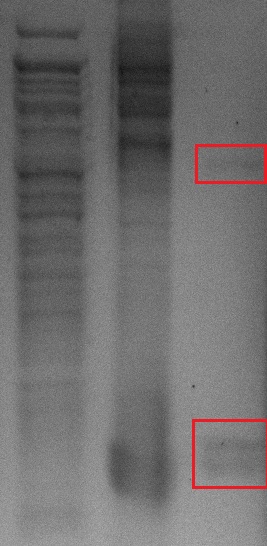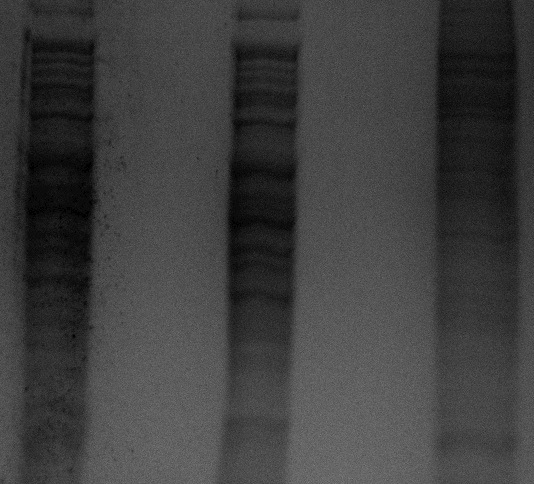Difference between revisions of "Part:BBa K772100"
| Line 9: | Line 9: | ||
To see how this part works: [https://parts.igem.org/Part:BBa_K772100:Experience] | To see how this part works: [https://parts.igem.org/Part:BBa_K772100:Experience] | ||
| − | + | '''RESULTS''' | |
After the correct ligation and cloning procedures, we extracted both bacterial and tumor cell protein ingredients via performing sonication. Affinity Gel Chromatography is performed on bacterial protein extract in order to isolate our EpCAM binding docks. These docks were exposed to tumor cell extract; thus the binding would occur. SDS-PAGE is done aftermath on the last solution. <br><br> | After the correct ligation and cloning procedures, we extracted both bacterial and tumor cell protein ingredients via performing sonication. Affinity Gel Chromatography is performed on bacterial protein extract in order to isolate our EpCAM binding docks. These docks were exposed to tumor cell extract; thus the binding would occur. SDS-PAGE is done aftermath on the last solution. <br><br> | ||
Latest revision as of 08:36, 5 October 2012
EpCAM Detection Device
This gene sequence includes both of EpCAM Binding Docks; BBa_K772001[1] and BBa_K772002[2]. Thus, this composite part is the main component of CTC (Circulating Tumor Cell) detection system. Docks include an EpCAM (Epithelial Cell Adhesion Molecule) antigen binding domain, OmpA transmembrane protein (dock) and TEV protease C or N terminus. Hopefully, after binding to the EpCAM antigen, TEV protease domains will fix together to form the full structure in order to activate the signalling pathway. (For more information: BBa_K772003[3]) EpCAM is an natural antigen which is found high significantly in the cases of some breast and colorectal cancer subtypes. On the upstream region of protein sequences, there are a constitutive pLac promoter and appropriate RBS.
To see how this part works: [4]
RESULTS
After the correct ligation and cloning procedures, we extracted both bacterial and tumor cell protein ingredients via performing sonication. Affinity Gel Chromatography is performed on bacterial protein extract in order to isolate our EpCAM binding docks. These docks were exposed to tumor cell extract; thus the binding would occur. SDS-PAGE is done aftermath on the last solution.
It is shown here the protein extract after the exposure to the EpCAM and the negative control, respectively.
Sequence and Features
- 10COMPATIBLE WITH RFC[10]
- 12INCOMPATIBLE WITH RFC[12]Illegal NheI site found at 13
Illegal NheI site found at 36
Illegal NheI site found at 1180
Illegal NheI site found at 1203 - 21COMPATIBLE WITH RFC[21]
- 23COMPATIBLE WITH RFC[23]
- 25COMPATIBLE WITH RFC[25]
- 1000INCOMPATIBLE WITH RFC[1000]Illegal SapI.rc site found at 441
Illegal SapI.rc site found at 1614


